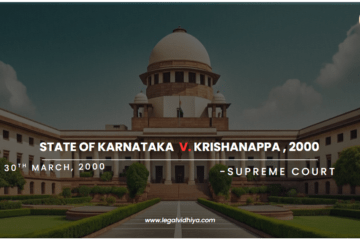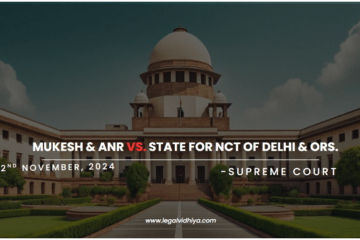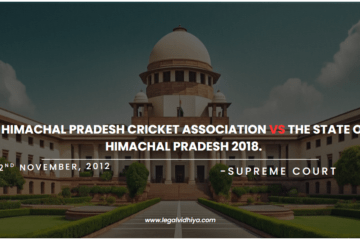
| Name of the Case: | Amish Devgan vs Union of India |
| Equivalent Citation: | 2021 SCC Online Del 3353 |
| Date of Judgment: | December 7, 2020 |
| Court: | Delhi High Court |
| Case Number: | 160 of 2020 |
| Case Type: | Writ Petition (Criminal) |
| Petitioner: | Amish Devgan |
| Respondent: | Union of India |
| Bench: | S. Abdul Nazeer, Sanjiv Khanna |
Facts of the Case:
The case of Amish Devgan vs Union of India was heard in the Delhi High Court in 2021. The case arose from certain remarks made by journalist Amish Devgan during a live debate on his TV news channel. During the debate, he made certain derogatory and offensive remarks against Sufi saint Khwaja Moinuddin Chishti, which were considered offensive by the Muslim community. Hereferred to Chishti as “lootera Chishti” and “aakrantak Chishti” which translated to as “Chishti the robber” and “Chishti the Terrorist”. As a result, several criminal complaints were filed against him and he was booked under various sections of the Indian Penal Code, including 153-A (promoting enmity between different groups on grounds of religion) and 295-A (deliberate and malicious acts intended to outrage religious feelings).
Mr. Amish Devgan then approached Delhi High Court seeking to quash the criminal complaints against him. He argued that his remarks were taken out of context and that he had not intended to hurt anyone’s religious sentiments. The Union of India, represented by the Delhi Police, opposed Amish’s plea and argued that the complaints against him were valid and needed to be investigated.
After hearing both sides, the High Court of Delhi refused to quash the criminal complaints against Mr. Devgan. The court held that the investigation into the complaints should continue, and that the final decision on whether Mr. Devgan’s remarks constituted an offense would be made by the trial courts. Overall, this case dealt with issues related to freedom of speech and expression, and highlighted the need to balance these competing interests in a democratic society.
Issues Raised:
- Whether the criminal complaints filed against him should be quashed?
- Whether his remarks constituted an offense under the Indian Penal Code?
Arguments of the Petitioner:
Amish Devgan argued that his remarks were taken out of context and that he had not intended to hurt anyone’s religious sentiments. He claimed that his comments were made during a live debate on a news channel and were meant to highlight a historical fact. He further argued that his remarks did not fall within the purview of hate speech and that he had a right to express his opinion on a matter of public interest. He even claimed that he had no intention of promoting enmity or disharmony between different religious communities. He argued that the complaints against him were politically motivated and aimed at stifling his right to free speech.
Arguments of the Respondent:
The respondents i.e., Union of India, contended that the criminal complaints against Mr. Devgan were valid and needed to be investigated. The complaints alleged that Amish Devgan had made derogatory remarks against a Sufi saint and had thereby hurt the religious sentiments of the Muslim community. The respondents further argued that Devgan’s remarks constituted hate speech and were likely to disturb communal harmony. The respondent submitted that freedom of speech and expression is subject to reasonable restrictions under article 19(2) of the Constitution of India. The respondent argued that Mr. Devgan’s remarks had the potential to incite violence and disturb public order, and therefore could not be protected under the Constitution.
Ratio Decidendi:
The ratio decidendi of this case is that freedom of speech and expression, as enshrined in Article 19(1)(a) of the Indian Constitution, is subject to reasonable restrictions under article 1992). The Court held that hate speech cannot be protected under the garb of free speech and expression, and that the use of words that are likely to hurt the religious sentiments of any community cannot be condoned.
Judgment:
The Court observed that the allegations against Mr. Devgan pertained to the use of certain words during a TV debate, and that the matter involved a question of law and fact that could not be decided at the interim stage. The Court therefore retained from going into the merits of the case, and limited its inquiry to the question of whether Mr. Devgan was entitled to protection from arrest pending investigation.
The Court noted that Amish had already appeared before the investigating officer in compliance with the summons, and had cooperated with the investigation. The Court further observed that statements made by the petitioner were made in the context of a debate on a matter of public interest and that there was no evidence to prove his intentions of promoting enmity or hatred. The Court concluded that Amish was entitled to protection from arrest pending investigation, subject to certain conditions.
The Court directed Mr. Devgan to join the investigation as and when required, and to cooperate fully with the investigating officer. The Court further directed him to refrain from making any statements or remarks that could hurt the religious sentiments of any community. In the light of the above, the Court allowed Mr. Devgan’s petition and granted him protection from arrest pending investigation, subject to the conditions mentioned above.
Conclusion:
The case of Amish Devgan vs. Union of India dealt with issues related to freedom of speech, hate speech, and protection of religious sentiments. The court’s decision underscored the need to balance the competing interests of free speech and the need to prevent the spread of hatred and communal disharmony. It also highlighted the role of the media in promoting responsible journalism and preventing the spread of hate speech.
This article is written by Bhoomi Aggarwal, an intern under Legal Vidhiya.




0 Comments